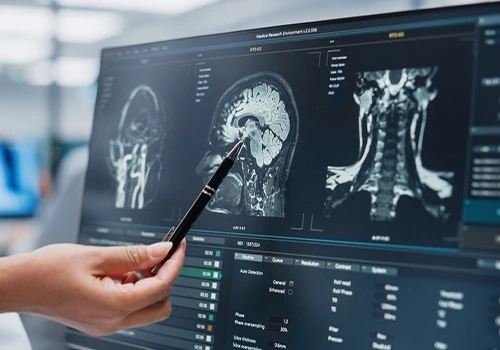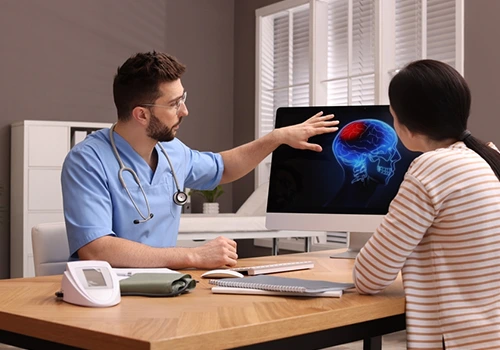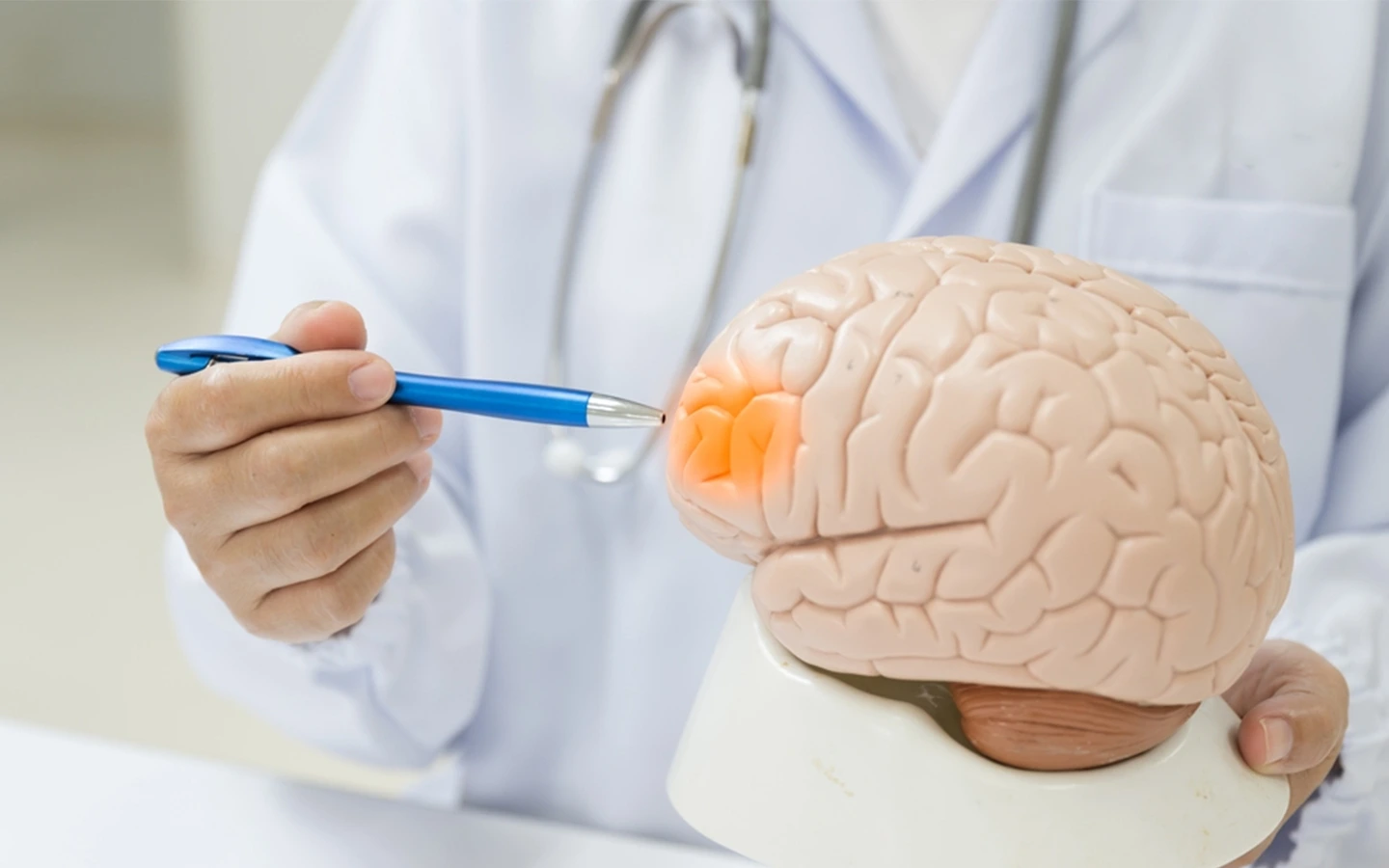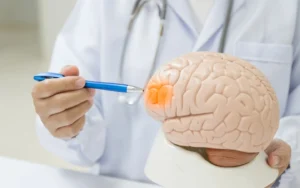Brain Cancer
What is Brain Cancer?
Brain cancer is the uncontrolled growth of brain cells that form masses known as brain tumors. Essentially, an accumulation of abnormal cells occupying space in the brain leads to the development of a brain tumor.
It’s worth noting that there are over 40 types of brain tumors, broadly classified into two categories:
- Benign Tumors: Benign tumors have slow growth and do not spread to other parts of the body. They are not considered cancerous.
- Malignant Tumors: These tumors are cancerous, with a high growth rate, and they can spread to other parts of the brain and spinal cord.
While any brain tumor is regarded as a serious and life-threatening condition due to its invasive and confined nature within the limited space of the skull, malignant brain tumors are not necessarily always fatal.
The level of risk and threat posed by a tumor is dependent on a combination of multiple factors such as the type of tumor, its location and size, and how it spreads. Since the brain is completely enclosed by the skull, early and timely diagnosis of brain tumors is only possible through the use of paraclinical tools and specific diagnostic equipment that effectively assess the condition inside the cranial cavity.
The diagnosis of a brain tumor typically occurs in the advanced stages of the disease and under circumstances where the presence of the tumor leads to unexplained symptoms in the patient.
The most common types of brain tumors include astrocytomas, oligodendrogliomas, glioblastomas, and mixed gliomas. In cancer, the mechanism of cell division becomes disturbed, and cells proliferate abnormally. Brain cancer is considered the most prevalent type of cancer in men.
Brain cancer is categorized into two groups:
- In primary tumors, cancer originates from a tumor in the brain and never spreads to other parts of the body.
- Secondary tumors (or metastatic tumors), on the other hand, belong to the invasive category, originating from the spread of cancer from other parts of the body to the brain.
Symptoms of Brain Cancer
Both benign and malignant brain cancers can exhibit similar symptoms, and in some cases, they may present with a variety of chronic or intermittent symptoms. The most prominent symptom of brain cancer is recurrent headaches, especially long-lasting headaches.
Other symptoms that may indicate the presence of brain cancer include vomiting, disturbances in walking and speech, changes in consciousness, vision impairment, functional and behavioral disorders, or paralysis of the body or face. The patient must seek medical attention if any of these symptoms are observed.

Causes of Brain Cancer
Multiple factors can contribute to the development of brain tumors, but two significant factors stand out.
The first factor pertains to individuals exposed to intense radiation, particularly to their heads, while the second factor is associated with individuals who have specific genetic or hereditary conditions.
Brain Cancer Treatment
The treatment of brain cancer is contingent upon multiple factors, including :
- the type of tumor
- its location
- and size
- as well as the overall health and age of the patient
Taking these considerations into account, chemotherapy and surgical interventions are considered primary treatment methods for brain tumors. It’s worth mentioning that benign brain tumors particularly respond well to surgical treatment, and many individuals can achieve complete recovery and regain their previous quality of life after treatment.
Furthermore, tumor treatment can also include radiation therapy and pharmacological interventions. If complete removal of the cranial mass through surgery is not feasible, alternative treatment methods may be employed to prevent progression and alleviate associated symptoms, as the tumor size and edema decrease.
In this regard, radiation therapy, either alone or in combination with oral chemotherapy drugs, is used. Some treatments solely improve the symptoms and disease-related complications. It’s important to note that the ultimate goal of treatment is to enhance the patient’s overall well-being.
The Duration of Hospitalization and Post-Brain Cancer Surgery Care
The recovery period following brain tumor surgery can vary from a short stay of a few days to an extended period of several weeks, depending on the type of tumor and the complexity of the surgical intervention. In the case of benign tumors, patients can resume their daily activities after a few days of recovery.
Conversely, for malignant tumors, the recovery period is longer and may take several weeks. Sometimes, a physician may employ complementary treatments to address the disease after surgery, and the patient may be required to undergo chemotherapy or radiation therapy for several months to eradicate the disease.
When recovering from brain tumor surgery, the top priority should be given to wound care. Special attention must be paid to proper wound care to facilitate rapid healing and the recovery of the affected area. The duration of recovery typically spans two weeks, although the rate of recovery depends on the patient’s overall health and dietary habits.
For individuals with underlying conditions such as diabetes, the recovery process is longer and requires more attention.

Key aspects of wound care include:
- Maintaining the cleanliness of surgical wounds is of utmost importance. Continuous dressing changes should be done daily.
- During sleep, it is crucial to avoid putting pressure on the wound and refrain from placing weight on it. This helps prevent blood circulation disturbances at the wound edges, which can prolong the healing process.
- In addition, smoking and alcohol consumption can hinder the body’s tissue healing and significantly slow down the wound-healing process. Therefore, it is strongly recommended to abstain from smoking during the entire recovery period.
- For patient comfort, absorbable sutures are typically used for wound closure. However, if non-absorbable sutures are used by the surgeon for any reason, it is essential for the patient to visit medical care for suture removal approximately 10 to 14 days after surgery.
- To expedite the wound healing process and promote the closure of the surgical wound gap, it is recommended that individuals refrain from taking showers for 5 to 7 days after the operation. When the wound is completely dry and free from any signs of infection such as redness or discharge, you may continue bathing.
During bathing, it is advised to use a mild baby shampoo and gently clean the wound. After a two-week examination by a medical specialist, patients may resume bathing without any restrictions.
Performing Daily Activities After Surgery
Following brain tumor surgery, a common inquiry is about the duration of rest and the appropriate time to resume daily activities. As previously mentioned, post-surgery recovery depends on the nature and severity of the tumor. In cases where the tumor’s location is unfavorable, posing a risk to cognitive and motor functions, patients may require an extended period of rest.
In such situations, it is crucial that patients do not remain bedridden for an extended duration. Instead, patients should engage in slow movements with the assistance of a wheelchair, walker, or aid from others. This promotes limb stimulation and prevents blood clot formation in the leg veins. Patients with mobility should also be mindful of this aspect and refrain from prolonged bed rest during their recovery phase.
Furthermore, there are specific activities that patients recovering from brain tumor surgery should avoid.
- It is recommended to refrain from prolonged use of electronic devices, including mobile phones, and minimize exposure to radiofrequency waves. This precaution applies not only to brain tumor patients but also to individuals in good health, as it carries potential risks.
- Patients undergoing brain tumor surgery may experience various postoperative complications such as headaches, dizziness, and seizures. Therefore, it is recommended that patients refrain from driving for at least six to seven weeks following surgery. Additionally, patients are advised to avoid leaving their homes during the recovery period without a companion and to steer clear of activities involving high altitudes.
- If a patient experiences memory disturbances, it is advisable for them to maintain connections with friends and family. However, avoiding crowded areas to prevent patient fatigue is important.

The role of nutrition in the treatment of brain cancer
Following the occurrence of a brain tumor, the patient’s level of consciousness is significantly compromised, rendering them incapable of consuming a diverse range of food items for a duration of twenty-four hours.
- Consequently, prescribing fluids as a means to provide the necessary nutrients for the patient’s nutrition is highly recommended.
- Subsequently, after regaining consciousness following the aforementioned time frame, the patient may gradually begin incorporating soft foods like soup into their dietary regimen for nutritional purposes.
- Ultimately, the patient may revert to their usual dietary habits, albeit with specific modifications such as consuming low-sodium foods and refraining from fatty and sugary substances.
The consumption of specific types of food, such as dairy products, meat, eggs, and poultry, including fatty fish, low-carbohydrate vegetables, and fruits like cabbage and lemon, along with healthy fats like olive oil, sunflower oil, avocado, and coconut oil, in addition to pomegranate and unsalted nuts, effectively reduces the growth of tumors and significantly increases the lifespan of individuals afflicted with cancer.
Iran
Iran is recognized as a highly skilled and advanced country in the field of cancer treatment, attracting a significant number of international patients seeking medical care annually.
Dr. Maadico strives to assist patients throughout their medical journeys, encompassing everything from initiating medical travel, obtaining visas, arranging accommodation, and transportation, familiarizing them with medical facilities, and guiding them in the process of transferring funds for medical expenses.
Get a Free Consultation
Frequently Asked Questions
- What is the cost of brain cancer treatment?
In reality, it is not possible to determine an exact amount for the cost of brain cancer treatment. Depending on various factors such as the disease’s progression, location, benign or malignant nature of the tumor, and the type of treatment, the cost can vary.
- What are the prevention methods for brain cancer?
Due to the significant unknowns surrounding the causes of brain cancer, there is no singular solution for its prevention. However, adopting a healthy diet and avoiding exposure to harmful substances and chemical radiation can reduce the risk of developing a brain tumor.

- Is brain cancer an inherited disease?
Genetic deficiencies can predispose individuals, but environmental factors are the primary causes of this disease.
- What is the role of nutrition in the occurrence of brain cancer?
Adequate and healthy nutrition is effective in preventing various diseases, including brain cancer.
- What are the consequences of brain cancer?
Motor disturbances, speech and memory problems, recurrent headaches, nausea, vomiting, and in some cases, seizures are among the recognized effects of brain cancer.
- How many sessions of chemotherapy are required for treating brain cancer?
The number of necessary chemotherapy sessions for treating brain cancer varies among individuals based on their physical condition and immune system, as well as the progression of the disease, and is determined by the specialist physician’s diagnosis.
- What is the hospitalization duration for brain tumor surgery?
The length of a patient’s hospital stay after brain tumor surgery varies from several days to a few weeks and depends on the complexity of the surgery and the patient’s age. For benign tumors, hospitalization typically lasts 3 to 4 days, while for malignant tumors, it can range from 1 to 2 weeks.


